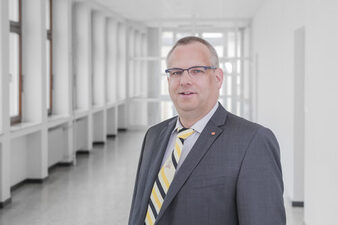About the project
The ViMaCs project is a cooperation between the Fachhochschule Dortmund (FHDO), the Kyiv National University of Construction and Architecture (KNUCA), the West Ukrainian National University (WUNU) and the National University "Zaporizhzhia Polytechnic" (NU-ZP). In the second funding phase, Lviv Polytechnic National University (LPNU) will also be integrated. The aim is to develop a digital Master's module portfolio in the field of data science and the necessary IT infrastructure (cluster of appropriately equipped servers). The modules will be integrated into Master's programs on digital transformation at all four partner universities and, building on this, double degrees will be sought. The partners know each other from a cooperation in project management and have acquired the joint Erasmus+ KA2 CBHE project WORK4CE in addition to an ongoing DAAD Eastern Partnership and an Erasmus+ KA107. The Ukrainian partners are also associated and the FHDO is a core member of the European EuroPIM consortium (including as part of a DAAD Strategic Partnership at the FHDO), which, among other things, forms the largest academic network in project management in Europe. The common goal is to establish an international Master School on the topic of "Managing the Digital Transformation" at the interface between project management and digitalization. After a first, successful funding phase from 01.10.2019 to 30.09.2021, a second funding phase from 01.12.2021 to 30.11.2023 was added.
The ViMaCs project creates the necessary conditions for the Ukrainian partners for a digital and virtual teaching and learning infrastructure in the field of data science, which is very important for the digital transformation. With regard to the funding objectives of the call, ViMaCs contributes to establishing the model of the virtual, cross-border Master School as a cooperation and internationalization instrument in Ukraine. The innovative aspect is the combination of interdisciplinary and international teaching modules with a networked IT environment that creates a practice-oriented lab and training environment and at the same time supports cooperation between the partners.
The core is the development and implementation of a digital teaching and learning offer in the field of versatile and highly topical "Data Science" by establishing an innovative and inherently digitized structure of a Master School. The digital competence of the partners will be further developed through the establishment and use of the program, including through a planned pilot teaching with evaluation, a training program and, above all, through the establishment of expert groups (so-called Communities of Practice - CoP) as "owners" of the modules and IT environments.
Scholarships are not planned; short-term mobilities (lecturers and some students) will be organized in a sequence of block courses coordinated via an academic calendar. Participation in the block courses is therefore primarily possible virtually for students. The ViMaCs consortium is open to further partners. The selection of Ukrainian partners will strengthen and expand a national teaching and research network in the field of "Managing the Digital Transformation", which is both cooperative and attractive in Europe and attracts other Ukrainian universities. Some of the instruments, processes and tools have already been tested in the EuroPIM consortium or are also due to be introduced there, so that comprehensive synergies and knowledge transfer are guaranteed.
On the FHDO side, the central scientific "Institute for the Digital Transformation of Application and Living Domains (IDiAL)" is involved as project manager, which has comprehensive digitalization expertise in research and teaching and operates virtualized IT environments itself. Through EuroPIM and IDiAL, ViMaCs will therefore integrate the Ukrainian partners even more closely into the European higher education and research area.
Sponsor
Funding code
Phase 1 (01.10.2019 - 30.09.2021)
Project ID: 57513461
Phase 2 (01.12.2021 - 30.11.2023)
Project ID: 57602060
Funding program / Research program
DAAD funding programme: Supporting the internationalization of Ukrainian universities: Shaping the digital future together: German-Ukrainian university cooperation 2019-2021
Cooperation/project partners
- Dortmund University of Applied Sciences and Arts (Fachhochschule Dortmund), Germany
- Kyiv National University of Construction and Architecture (KNUCA), Kyiv, Ukraine
- West Ukrainian National University (WUNU), Ternopil, Ukraine
- National University "Zaporizhzhia Polytechnic" (NU-ZP), Zaporizhzhia, Ukraine
- Lviv Polytechnic National University (LPNU), Lviv, Ukraine
Contact & Team
Contact persons
Management
Prof. Stephan Recker, Dr.
- +49 231 91126710
by arrangement


